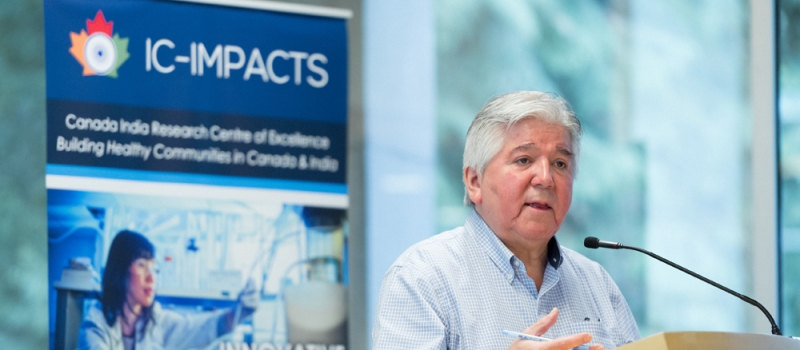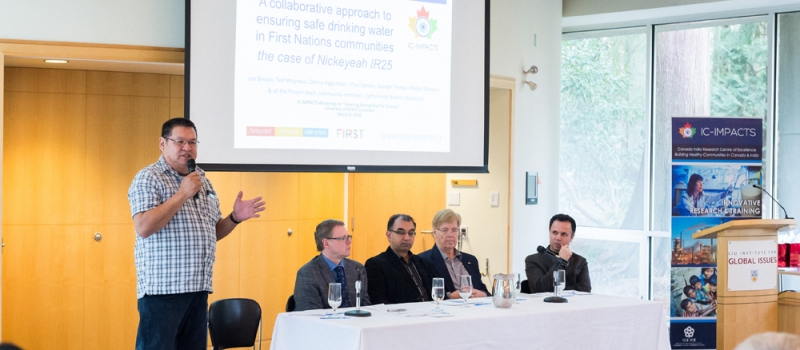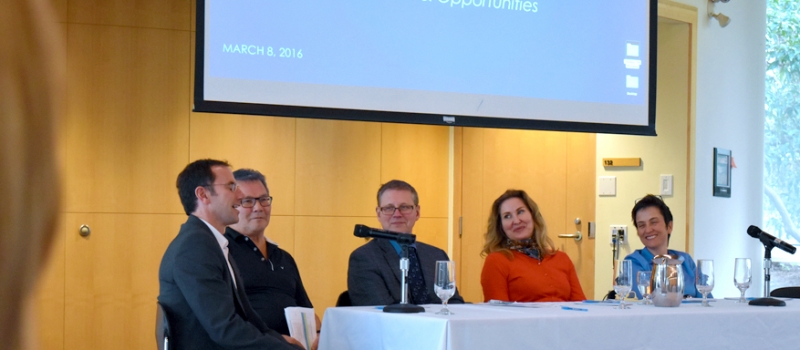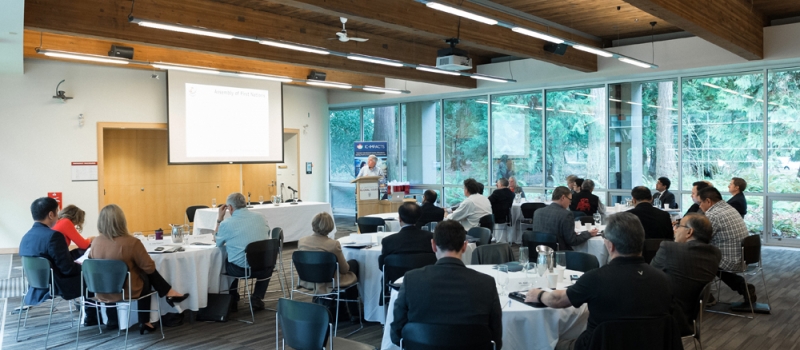On March 8, 2016, IC-IMPACTS invited First Nations community members, government officials, industry experts, and leading researchers to come together and participate in a workshop on pressing water and infrastructure issues in First Nation communities. The result was an invigorating workshop that led to new opportunities, innovative solutions, and a shared, deeper understanding of First Nation community needs.
 Pressing Issues
Pressing Issues
The workshop opened with an official welcome from Elder Larry Grant of the Musqueam people. Mr. Irving Leblanc, Special Advisor to the Assembly of First Nations then provided an overview of the current water and infrastructure challenges in First Nation communities.
He noted that the current water issues are multifaceted, ranging from policy to technology. While remote monitoring technologies can really aid communities, water policy that respects First Nations water rights need to be developed. He stated, “The Safe Drinking Water for First Nations Act (2013) was put into place without proper consultation or resources and has created a serious problem for communities.”
Dr. Sylvia Struck, Manager of the Drinking Water Safety Program at the First Nations Health Authority provided the latest drinking water statistics in BC. “At the end of February, 26 communities were under drinking water advisories: 22 communities were under boil water advisory and 4 communities were under do not consume advisory.”
With an estimated $8.8 billion gap for First Nations infrastructure in Ontario alone, First Nation communities also face pressing infrastructure challenges. Over 130,000 housing units across Canada are needed over the next 25 years. Although these challenges are complex, they also present opportunities for collaborative and innovative solutions.
Community-Based Case Studies
The workshop also served as a knowledge exchange about two successful partnership stories on community-based projects. The first case-study featured a panel of individuals related the the Lytton First Nation project.
 Jim Brown, a water operator in Lytton First Nation was tired of the season boil water advisories in his community. He connected with Dr. Madjid Mohseni, who worked with community members to develop a mobile water treatment system that would deliver cleaner, safer water to the community. The mobile treatment system was deployed at one of the reserves within the Lytton First Nation in the Fall of 2014 where it was hooked up to the community’s water supply – allowing for the evaluation of various alternative treatment options. This strategy allowed the research team to pick a treatment technology that was most suitable for the community and helped local water operators to become familiar with the proposed technology and offer feedback towards optimizing the process.
Jim Brown, a water operator in Lytton First Nation was tired of the season boil water advisories in his community. He connected with Dr. Madjid Mohseni, who worked with community members to develop a mobile water treatment system that would deliver cleaner, safer water to the community. The mobile treatment system was deployed at one of the reserves within the Lytton First Nation in the Fall of 2014 where it was hooked up to the community’s water supply – allowing for the evaluation of various alternative treatment options. This strategy allowed the research team to pick a treatment technology that was most suitable for the community and helped local water operators to become familiar with the proposed technology and offer feedback towards optimizing the process.
“I’ve worked on projects in First Nation communities for over twenty years and this project had one of the most unique and successful community engagement I’ve seen.”
Irfan Gehlen, Water Supply & Treatment Leader at Kerr Wood Leidal
The successful pilot demonstration led to the permanent installation of the technologies at the community and resulted in the elimination of seasonal boil water advisories.
“Getting communities off boil water advisories is not a long-term goal, it’s a short-term goal. We’re aiming to get 10 communities off boil water advisories over the next 4 years.”
Ted Molyneux, Senior Water and Wastewater Engineer at Indigenous and Northern Affairs Canada
 The second case-study featured a panel of individuals related the Thondebavi pavement project. Community members in Thondebavi, India were in desperate need of improved road infrastructure; extreme heat and monsoon weather made it difficult for people to even visit nearby villages and get produce. IC-IMPACTS worked with the community and various Canadian and Indian partners to develop and construct pavements in the community using advanced technologies to increase the road’s lifespan and reduce its greenhouse gas emissions. The new road is divided into three segments, each using a slightly different thickness and proportion of materials. This approach allows the road to become a living research project that will physically demonstrate which segment of the road performs best. Each section uses super thin pavement technologies that significantly reduce the amount of concrete needed in the construction of the road, and innovative fibers that increase the roads overall strength and durability.
The second case-study featured a panel of individuals related the Thondebavi pavement project. Community members in Thondebavi, India were in desperate need of improved road infrastructure; extreme heat and monsoon weather made it difficult for people to even visit nearby villages and get produce. IC-IMPACTS worked with the community and various Canadian and Indian partners to develop and construct pavements in the community using advanced technologies to increase the road’s lifespan and reduce its greenhouse gas emissions. The new road is divided into three segments, each using a slightly different thickness and proportion of materials. This approach allows the road to become a living research project that will physically demonstrate which segment of the road performs best. Each section uses super thin pavement technologies that significantly reduce the amount of concrete needed in the construction of the road, and innovative fibers that increase the roads overall strength and durability.
“The current funding model for sustainable infrastructure needs to be revised. Our department has not funded road infrastructure in 20 years and I’m excited to look at what IC-IMPACTS has done in India.”
Danny Higashitani, Senior Engineer at Indigenous and Northern Affairs Canada.
 Developing Paths Forward
Developing Paths Forward
The second half of the workshop focused on the water and infrastructure priorities and opportunities in First Nation communities. The discussions highlighted that rural communities in India are facing similar challenges as First Nation communities in Canada.
IC-IMPACTS is currently working with Lubicon Lake Nation on a potential pavement project, similar to the demonstration pavement in Thondebavi. Meanwhile Dr. Madjid Mohseni is testing is water treatment technologies in other First Nation and non-First Nation communities in BC.
“Over 50% of the population is under twenty-five in both India and First Nation communities. The Public Health statistics are also very similar. Solutions developed in India can definitely be brought back into First Nation communities, just at a different scale,” said Mr. Leblanc. “I think the model that IC-IMPACTS has put in place, working at the community level is excellent. We’re ready to embrace new ideas.”
2024 IC-IMPACTS Conference in Delhi December 9 - 11, 2024 New Delhi, India